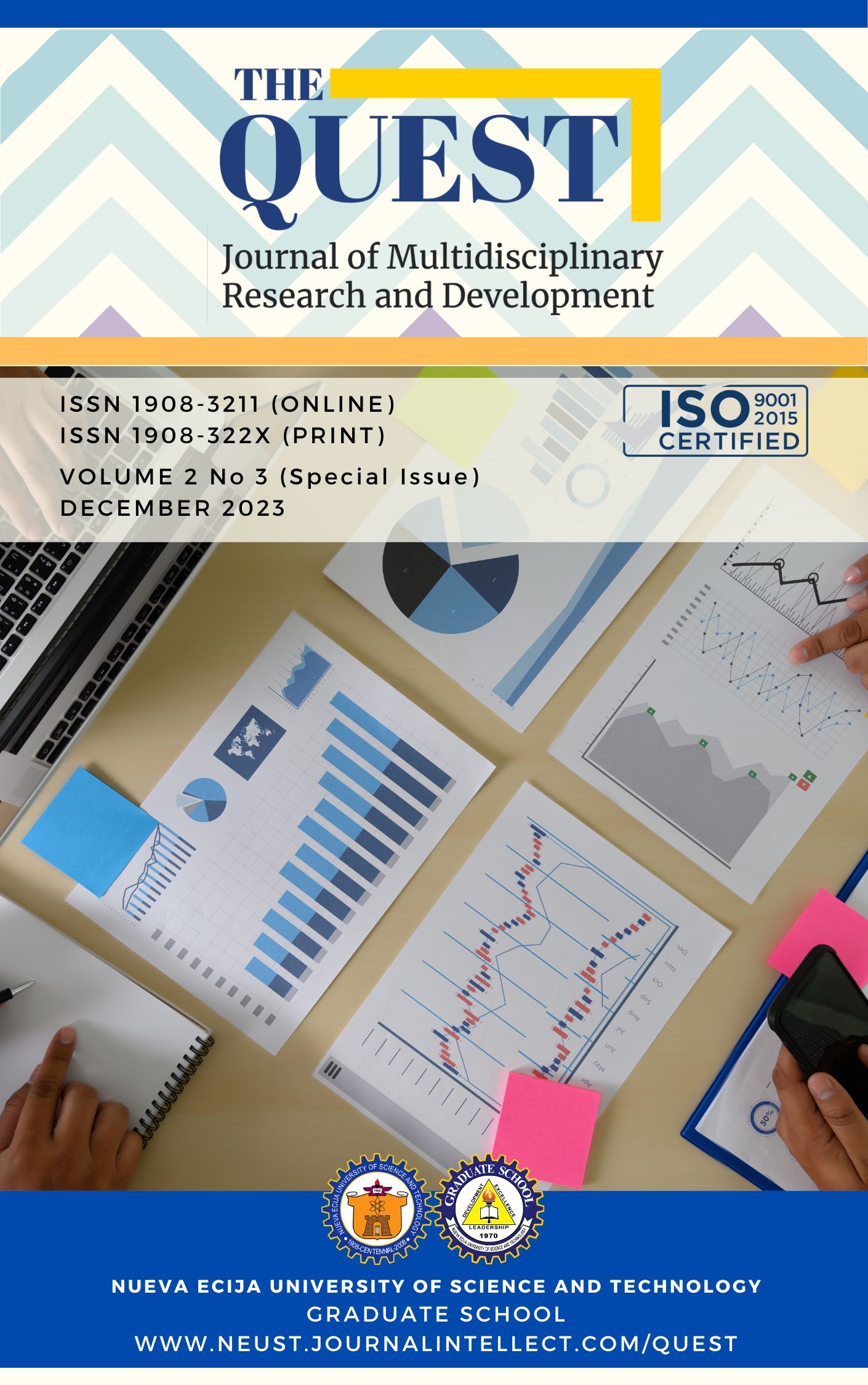Extent of Online Platform Utilization of the School of Industrial Technology Faculty Members

Published 12/30/2023
Keywords
- Online learning platform,
- Network and internet connectivity,
- Connectivity assistance
How to Cite
Copyright (c) 2023 The QUEST: Journal of Multidisciplinary Research and Development

This work is licensed under a Creative Commons Attribution-NonCommercial 4.0 International License.
Abstract
This study delved into identifying the most frequently used online learning platform of ASCOT-School of Industrial Technology (SInT) along with their motivation for usage and challenges faced. The respondents were all 24 SInT faculty members, comprising 15 males and nine (9) females, respectively. The study used a survey questionnaire carried out through Google Forms. Results show that Google Meet is the most frequently used online learning platform by SInT faculty members, followed by Facebook (Messenger and Groups), Google Classroom, Zoom, and YouTube, respectively. Accessibility was revealed to be the most important reason considered in the use of online learning platforms, while issues with stable and limited network and internet connectivity are the most salient concerns. From the results of this study, it is recommended to: a) sustain plans and programs intended for connectivity assistance (financial or devise-wise) for students and faculty members; b) integrate efficient online measures in the transition to full face-to-face classes; c) strengthen locally developed (ASCOT or SInT-based) digital programs that would cater to the specific needs and challenges of the community; and d) equip faculty members with digital competency through skills training and workshops on computer and technology.
References
- Al-Maroof, R. S., Alshurideh, M. T., Salloum, S. A., AlHamad, A. Q. M., & Gaber, T. (2021, March). Acceptance of Google Meet during the spread of Coronavirus by Arab university students. In Informatics (Vol. 8, No. 2, p. 24). MDPI.
- Barnard, L.; Lan, W.Y.; To, Y.M.; Paton, V.O.; Lai, S.L. Measuring self-regulation in online and blended learning environments. Internet High. Educ. 2009, 12, 1–6. [Google Scholar] [CrossRef]
- Baygi, R. M., Hultin, L., & Introna, L. (2021, March). EVERYTHING FLOWS: STUDYING CONTINUOUS SOCIOTECHNOLOGICAL TRANSFORMATION IN A FLUID AND DYNAMIC DIGITAL WORLD. MIS Quarterly, 45(1), 423-452.
- Chogyel, N., Wangdi, N., & Dema, Y. (2021). Evaluating the challenges in online learning during the COVID-19 pandemic in a middle secondary school. International Journal of Didactical Studies, 2(2), 101459. https://doi.org/10.33902/IJODS.2021269731
- Christensen, D. (2019, July 2). The history of the emergence of technology in education. Classcraft. Retrieved November 22, 2022, from https://www.classcraft.com/blog/the-history-of-the-emergence-of-technology-in-education/
- DeCoito I, Estaiteyeh M. Transitioning to Online Teaching During the COVID-19 Pandemic: an Exploration of STEM Teachers' Views, Successes, and Challenges. J Sci Educ Technol. 2022;31(3):340-356. doi: 10.1007/s10956-022-09958-z. Epub 2022 Mar 28. PMID: 35369535; PMCID: PMC8958807.
- Hermanto, Y. B., & Srimulyani, V. A. (2021). The challenges of online learning during the covid-19 pandemic. Jurnal Pendidikan Dan Pengajaran, 54(1), 46-57.
- Jogezai, N. A., Baloch, F. A., Jaffar, M., Shah, T., Khilji, G. K., & Bashir, S. (2020, August 1). Teachers' attitudes towards social media (SM) use in online learning amid the COVID-19 pandemic: the effects of SM use by teachers and religious scholars during physical distancing. Heliyon.
- Purwanto, E., & Tannady, H. (2020). The factors affecting intention to use Google Meet amid online meeting platforms competition in Indonesia. Technology Reports of Kansai University, 62(06), 2829-2838.
- Peimani N, Kamalipour H. Online Education and the COVID-19 Outbreak: A Case Study of
- Online Teaching during Lockdown. Education Sciences. 2021; 11(2):72. https://doi.org/10.3390/educsci11020072 The Evolution Of Technology In The Classroom | Purdue Online. (n.d.). Purdue Online. Retrieved November 22, 2022, from https://online.purdue.edu/blog/education/evolution-technology-classroom
